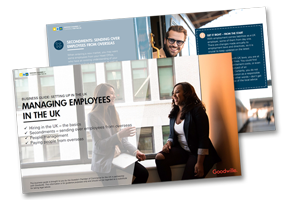
Building a workforce in the UK
17 November 2020
Advertorial
Expanding your business to the UK means that you will be entering one of the world’s largest economies, with access to some of the best talent out there. Whether you are planning to register a UK entity or scale a team, employ directly into your Swedish entity, or transfer employees to the UK from overseas, you need to take local laws and guidelines into consideration. “Make sure that you have the foundations in place which are compliant with UK law. They are vital to an employment relationship and can help to eradicate headaches in the future,” says Jacqui Brown, HR Manager at Goodwille.
Goodwille provides essential business services to Swedish companies looking to enter, grow or scale in the UK. With clients headquartered around the world, and with a strong focus on Scandinavia, Goodwille has helped nearly 2,000 businesses, from pre-revenue start-ups to global retail chains, over the course of 20 years. “We support our clients with their noncore business activities, such as corporate governance, finance and human resources, which gives them more free time to focus on the things that bring real value to their business,” says Jacqui.
Competitive and candidate-driven market
With its diverse and multicultural talent pool, recruiting in the UK can differ a lot from the conditions in Sweden. Jacqui explains: “The UK and particularly London can be a very competitive and candidate-driven market and certainly pre-Covid, this would be the accurate description. Even now, especially the tech industry, which arguably was already in a more solid position to future proof for the working from home model which Covid has forced upon the UK working populace, is still very candidate-driven.” Furthermore, recruitment in the UK can be a fast-paced environment and candidates are keen to know more about the opportunity at hand. “It is generally not all about the remuneration side of things, although of course this plays a part. Candidates are interested in your employer brand, about company culture and what development opportunities there will be for them.”
Compliance from day one
If you are looking to employ team members working in the UK, they need a contract compliant with UK employment law and not the country of the parent company – and they need it from day one of employment at the latest. “Statutory rights differ from country to country, so bear this in mind when considering things such as notice periods, annual leave allowances and how holiday is accrued, sick pay, types of family leave, rights on disciplinary, grievances and terminations,” Jacqui says and continues: “This is why it is vital to use an expert in UK HR or UK legislation. When it comes to employer benefits, nothing is compulsory aside from the provision of a workplace pension scheme which is in line with Auto Enrolment legislation.”
Bringing employees from overseas
When bringing employees from an overseas HQ to work in the UK, there are several considerations to take into account. “Aside from the employment law elements, consider if they will be in the UK on a temporary or permanent basis. If temporary, then they could potentially benefit from a secondment situation where they can continue their primary employment with the HQ and claim some Temporary Workplace Relief for their temporary work in the UK, and remain in the Swedish Social Security System. If they are relocating to work in the UK permanently, they would be hired locally and pay tax and National Insurance in the UK as usual,” Jacqui says.
Right to Work post Brexit
With the UK’s departure from EU looming around the corner, there will be a new set of rules and regulations to consider when hiring or bringing employees from overseas. “We do need to be mindful of 31 December 2020, which is the deadline to arrive in the UK before the end of freedom of movement, when it comes to the Right to Work for EU Nationals in the UK. EU Nationals who arrive in the UK before 31 December 2020 have until summer 2021 to apply for pre-settled status. Arrivals post 31 December are still possible, but there are work visa’s and sponsorship licence applications to consider.”
Long-term plan
Jacqui suggests that businesses about to hire their first employees in the UK should have a long-term plan for competitive employment offerings: “Even if you wish to start on a lean model in terms of benefits initially, look at what similar companies to you are doing that you can perhaps implement once you start to scale. Benchmarking is a good idea to understand salaries and benefit offerings.” She adds: “Also, make sure that you have partnered with an expert in HR or employment law to know that you have the foundations in place which are compliant with UK law, such as your employment contracts and policies. They may seem like a small consideration, but they are vital to an employment relationship and can help to eradicate headaches in the future.”
Key considerations when building a workforce in the UK
- Think about your employer brand
- Make sure you know your competitors and what they are offering and doing
- Make sure you are compliant with UK law from day 1
- Find a competent partner who can guide you
For more information, please contact, jacqui.brown@goodwille.com.
Get more insights in the new SCC business guide
Whether you are planning to register a UK entity or scale a team, employ directly into your AB entity, or transfer employees to the UK from overseas, you must take local laws and guidelines into consideration. UK employment law is different than in Sweden, and if you get it wrong it can be costly.

Join our mailing list
and keep up-to-date with the Chamber's news and events.
Read our Privacy Policy here